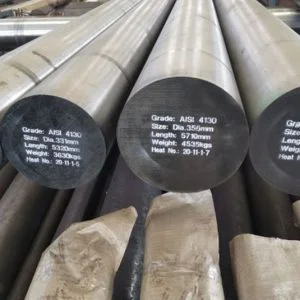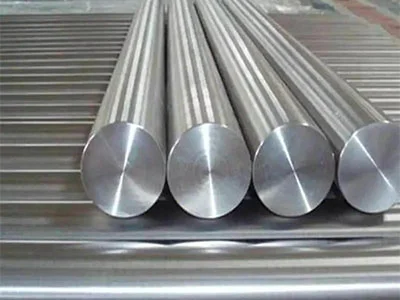Introduction

In the realm of industrial machinery, materials play a pivotal role in determining performance, durability, and cost-effectiveness. Among these materials, 4130 alloy steel stands out for its remarkable properties and diverse applications. This article delves into the multifaceted ways in which 4130 alloy steel enhances various aspects of industrial machinery.
Properties of 4130 Alloy Steel
4130 alloy steel stands out in the realm of materials for industrial machinery due to its exceptional mechanical properties, making it a preferred choice across various applications. Let’s delve deeper into the key characteristics that make 4130 steel indispensable in heavy-duty machinery manufacturing:
- High Strength-to-Weight Ratio: One of the most striking features of 4130 steel is its impressive strength-to-weight ratio. This property enables the fabrication of sturdy machinery components without adding unnecessary bulk, leading to more efficient designs and reduced overall weight.
- Excellent Weldability: Weldability is crucial in the manufacturing process, allowing for the seamless joining of components. 4130 steel exhibits excellent weldability, ensuring ease of fabrication and assembly. This characteristic not only streamlines production but also enhances the structural integrity of welded joints.
- Good Machinability: Machinability refers to the ease with which a material can be shaped, cut, and finished using machine tools. 4130 steel boasts good machinability, facilitating precise manufacturing processes and intricate part geometries. Manufacturers can achieve tight tolerances and intricate designs, enhancing the functionality and performance of machinery components.
- Toughness and Durability: Industrial machinery operates in demanding environments subjected to high stress, impact, and fatigue. The inherent toughness of 4130 steel ensures exceptional durability under such conditions. Components fabricated from this alloy exhibit superior resistance to deformation, cracking, and premature failure, prolonging service life and reducing maintenance requirements.
- Corrosion Resistance: While not as corrosion-resistant as stainless steel alloys, 4130 alloy steel offers adequate protection against rust and corrosion, especially when properly coated or treated. This property is crucial for machinery used in harsh environments or exposed to moisture, chemicals, and other corrosive agents.
- Heat Treatability: Another advantage of 4130 steel is its responsiveness to heat treatment. By subjecting the material to controlled heating and cooling processes, manufacturers can tailor its mechanical properties to specific application requirements. Heat treatment can enhance hardness, strength, and toughness, further expanding the versatility of 4130 steel in industrial machinery applications.
Overall, the combination of high strength, weldability, machinability, toughness, and heat treatability makes 4130 alloy steel an invaluable material for the manufacturing of heavy-duty machinery components. Its ability to withstand extreme conditions while maintaining structural integrity ensures optimal performance and reliability in diverse industrial settings.
Applications in Industrial Machinery
From gears and shafts to structural components, 4130 alloy steel finds widespread use in industrial machinery. Its ability to withstand high stress and fatigue makes it a preferred material for critical parts subjected to intense operational conditions.
Enhancing Durability and Performance
The inherent toughness of 4130 steel contributes significantly to the longevity and reliability of industrial machinery. Components fabricated from this alloy exhibit enhanced resistance to wear, corrosion, and impact, ensuring prolonged service life and minimal downtime.
Cost-Effectiveness and Versatility
Despite its superior performance characteristics, 4130 steel offers cost advantages over certain alternative materials. Its versatility allows for streamlined manufacturing processes and greater design flexibility, resulting in overall cost savings for industrial machinery producers.
Comparative Properties of 4130 Alloy Steel

| Property | 4130 Alloy Steel | Other Steel Alloys |
|---|---|---|
| Tensile Strength | High | Moderate |
| Yield Strength | Excellent | Average |
| Hardness | Superior | Comparable |
| Fatigue Resistance | Outstanding | Varies |
Conclusion
In conclusion, 4130 alloy steel stands as a cornerstone in the realm of industrial machinery, owing to its exceptional properties and versatile applications. From enhancing durability and performance to optimizing cost-effectiveness, this alloy continues to drive innovation and efficiency in various sectors.
FAQ
Q:What are the primary constituents of 4130 alloy steel?
A:4130 alloy steel primarily consists of iron, chromium, and molybdenum, with trace amounts of carbon and other alloying elements.
Q:Can 4130 steel be heat treated for further enhancement of its properties?
A:Yes, 4130 steel responds well to heat treatment, allowing for tailoring of mechanical properties to specific application requirements.
Q:Is 4130 alloy steel suitable for high-temperature applications?
A:While 4130 alloy steel exhibits good mechanical properties at elevated temperatures, it may not be ideal for prolonged exposure to extreme heat.
Q:What are some common manufacturing processes used with 4130 steel?
A:Machining, forging, welding, and heat treatment are among the common manufacturing processes employed with 4130 steel to fabricate industrial machinery components.
Q:Are there any notable limitations or drawbacks associated with the use of 4130 alloy steel?
A:While highly versatile and durable, 4130 alloy steel may exhibit reduced corrosion resistance compared to certain stainless steel alloys, necessitating appropriate surface treatments in corrosive environments.
